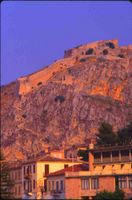
(To blog readers: My son is traveling to Greece in April with a group from Massachusetts’ Oliver Ames [OA] High School [see March 5 post]. To give students and parents a glimpse of some of the places on the group’s itinerary and to provide links to sites the travelers may find helpful, I’m devoting 10 consecutive daily posts from March 22 through March 31 to places on the kids’ Greek itinerary. [I can’t think of a better place than Greece to hang, really or virtually, but if you’d like to go elsewhere, cruise the archives to visit scores of other great places, from Jamaica to Jordan, Malta to Mexico.] Wherever you end up, Kalo taxidi! Have a good trip.)
OA's spring sports season is already underway, and many of the kids going to Greece in April will be missing practices, games, meets and matches. Kids, assure your coaches that you’ll keep those calves and quads tuned by taking advantage of the superlative workout opportunities your Greek journey will put literally in your path.
In Athens, a brisk sprint up the Acropolis hill. On Santorini, dashes up, down and through Fira’s steep, stepped streets. And in Nafplio, a vertigo-inducing run (or spirited walk if the sun is high and hot) up the 857 steps of Palamidi Fortress (photo above -- note zigzag stairs hanging onto the mountainside), the 17th-century Venetian bastion that sits 700-feet above the beautiful town, sea and Argolid plain. The Palamidi is Nafplio’s crown. If you take on this great outdoor Stairmaster, you’ll be rewarded at the top with views sure to take away any breath you’re lucky or fit enough to have left.
Nafplio (variously spelled Nauplio, Nauplion, Nauplia, Nafplion, Navplio...) is named for its legendary founder, Nauplios, son of Poseidon. The Palamidi is named for Nauplios’ son, Palamedes, an enterprising young man with an eclectic array of hobbies and pursuits. The ancient Greeks considered him to be king of inventors. (Odysseus and Diomedes, jealous of his genius, considered him a too-brilliant rival and had him killed.)
In addition to arranging letters introduced by the Phoenician, Cadmos, and inventing the order that turned them into the Greek alphabet, legend credits Palamedes with inventing lighthouses, money, numbers, weights and measures, and military tactics. Not content to be an ordinary overachiever, Palamedes became a great doctor and a celebrated astronomer.
He is also said to have been on the battlefield at Troy, where he invented pastimes that the poker players in the OA group (I believe there are one or two…) will appreciate: dice and board games to keep his fellow soldiers occupied while they waited for the siege order.
Comments or questions? Email me.
